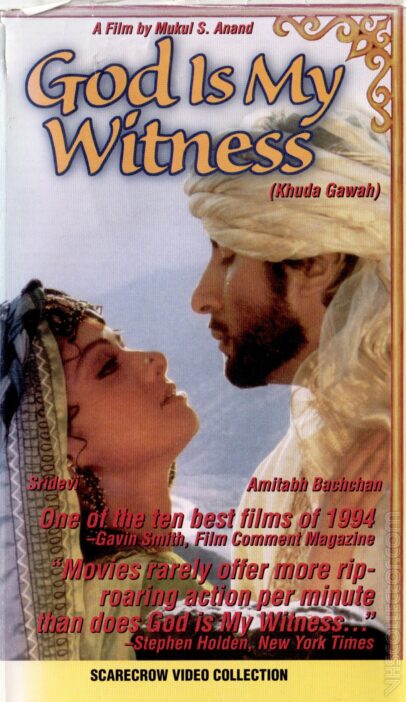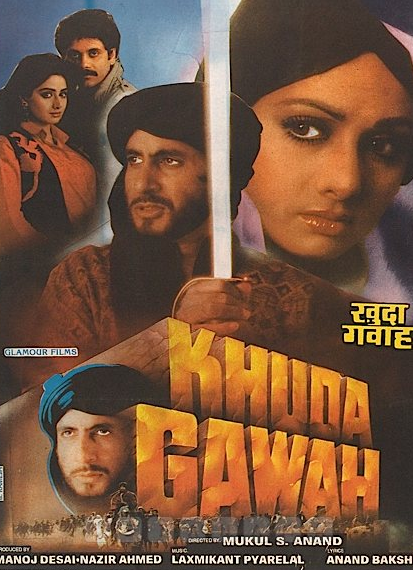 For many US film buffs the 1992 action-romance-musical epic GOD IS MY WITNESS (KHUDA GAWAH—a more accurate translation of which would be GOD IS THE WITNESS) represented our introduction to Hindi cinema—or, as it’s more widely known, Bollywood. That introduction was via a 1996 VHS put out by Seattle’s Scarecrow Video store, the first and last Scarecrow Video Collection release. Since then Scarecrow has operated the DVD outfit Subversive Cinema (through which it offered films like THE WITCH WHO CAME FROM THE SEA, DEFENCELESS and METAL SKIN), and GOD IS MY WITNESS has fallen into obscurity (although it was distributed on DVD by Eros and Shamaroo under its original title; I prefer the Scarecrow VHS, as it subtitles the songs, which the Eros DVD doesn’t, and includes the full 193 minute director’s cut, which neither of the DVD versions does).
For many US film buffs the 1992 action-romance-musical epic GOD IS MY WITNESS (KHUDA GAWAH—a more accurate translation of which would be GOD IS THE WITNESS) represented our introduction to Hindi cinema—or, as it’s more widely known, Bollywood. That introduction was via a 1996 VHS put out by Seattle’s Scarecrow Video store, the first and last Scarecrow Video Collection release. Since then Scarecrow has operated the DVD outfit Subversive Cinema (through which it offered films like THE WITCH WHO CAME FROM THE SEA, DEFENCELESS and METAL SKIN), and GOD IS MY WITNESS has fallen into obscurity (although it was distributed on DVD by Eros and Shamaroo under its original title; I prefer the Scarecrow VHS, as it subtitles the songs, which the Eros DVD doesn’t, and includes the full 193 minute director’s cut, which neither of the DVD versions does).
GOD IS MY WITNESS was a big deal in its day, featuring Bollywood’s most iconic stars Amitabh Bachchan (in what was intended to be his last-ever film appearance) and the late Sridevi, teaming up for the third time (following INQUILAB, 1984, and AAKHREE RASTA, 1986). The film was lensed quite extensively in Afghanistan (whose then-president Mohammad Najibullah deployed a large portion of the nation’s air force to provide security for Bachchan) by the late Mukul S. Anand, who had previously put Bachchan through his paces in AGNEEPATH (1990) and HUM (1991). Anand was awarded a Best Director trophy at the 38th Filmfare Awards (India’s equivalent of the Oscars) for this film, but only completed one more, the flop TRIMURTI (1995), before his untimely 1997 demise.
In what appears to be some distant past era a Buzkashi competition is being enacted between the Pathans, i.e. Pashto-speaking Afghanis (although everybody in this film speaks Hindi), and the Rajputs, i.e. residents of central and northern India, in which the carcass of a goat is dragged across a finish line by one of the two tribes following a massive horseback brawl. Among the competitors are Badshah Khan (Bachchan), a Pathan, and Benazir (Sridevi), a Rajput who not incidentally wins the competition. Its love at first sight for this pair, but their bliss is short-lived, as Benazir decrees that in order to win her hand Badshah must travel to India and kill the bandit Habibullah (Ali Khan), who’s responsible for the death of Benazir’s father. Badshah complies, but runs afoul of Ranveer Singh (Vikram Gokhale), a jailer.
The protocol-obsessed Ranveer is determined to lock Badshah up for killing Habibullah, but allows him to take Habibullah’s corpse back to Afghanistan and marry Benazir—provided he returns in thirty days to face justice. This Badshah does, and ends up serving a lengthy jail term, during which time he paints Benazir’s face on a wall of his cell (a reference to Sridevi’s status as a pin-up queen).
In the meantime Benazir gives birth to Badhsah’s child, a girl named Mehndi, just as Ranveer’s wife births a daughter he names Henna. Mehndi is raised by Badshah’s longtime pal Khuda Baksh (Danny Denzongpa), while Benazir, believing her beloved has died, goes mad. Things pick up when the teenaged Mehndi (Sridevi again) learns the truth of her parentage, just as the teenaged Henna (Shilpa Shirodkar) becomes a police officer. By this point the period detail of the earlier scenes has given way to a more modern atmosphere stocked with cars and planes, in which Pasha (Kiran Kumar), Habibullah’s evil brother, makes trouble for our heroes.
wife births a daughter he names Henna. Mehndi is raised by Badshah’s longtime pal Khuda Baksh (Danny Denzongpa), while Benazir, believing her beloved has died, goes mad. Things pick up when the teenaged Mehndi (Sridevi again) learns the truth of her parentage, just as the teenaged Henna (Shilpa Shirodkar) becomes a police officer. By this point the period detail of the earlier scenes has given way to a more modern atmosphere stocked with cars and planes, in which Pasha (Kiran Kumar), Habibullah’s evil brother, makes trouble for our heroes.
Upon learning that her father is still alive Mehndi travels to India. There things get even more complicated, with Mendhi falling in love with Raja (Nagarjuna Akkineni), one of her father’s jailers who also happens to be Henna’s main squeeze. Badshah gets released from prison due to good behavior and, not wanting to jeopardize Mehndi’s situation, neglects to tell her who he is.
Will Badshah ever get around to revealing himself to Mendhi? Will her romance with Raja be allowed to flourish? Will Pasha get his just desserts? Will Benazir ever regain her sanity? I’ll refrain from giving anything away (but will reveal that all those questions have the same answer).
The film is extremely fast paced—faster than most Bollywood productions—which makes the three-hour plus runtime pass quickly. In true Hindi movie fashion there’s enough melodrama to fill a half-dozen Hollywood productions, lots of impassioned sermons by Badshah about the sanctity of honor and duty (reflecting India’s idealized view of the people of Afghanistan), a reckless mixing of genres (including screwball comedy), and overripe dialogue like “Love shall reach its destination!” and “Who heeds the truth in a world of lies?” Excess is the film’s driving force, and its makers make no apology for it.
Yet director Mukul Anand adds a parodic, self-reflective angle that nearly puts the film in the company of PULP FICTION. Anand clearly knows and understands Bollywood conventions, and has fun with them; such self-awareness is rare in Bollywood, where shameless commercialism and overwrought earnestness tend to reign supreme.
The technical credits are admittedly on the choppy side (polish being something to which Anand, like his Bollywood peers, paid scant attention) and the script is filled with holes—how is it that Badshah is constantly traipsing back and forth between Afghanistan and India without ever having to travel through the more hostile territory of Pakistan (which, geographically speaking, he’d have to do)?—yet the film is engaging enough to wear down the defenses of an unreceptive viewer (a western viewer, in other words), provided one is willing to give it a chance.
Of course I’ll have to mention the music numbers, a Bollywood requisite. GOD IS MY WITNESS’S song and dance sequences combine the large-scale Busby Berkley esque choreography of old school Bollywood with the music video-ish stylings that have since come into vogue. What really distinguishes these sings from those of most Bollywood productions is how Anand integrates them into the bonkers climax, in which song, dance, action and melodrama are combined in a gloriously insane mixture that redefines epic
.
Vital Statistics
GOD IS MY WITNESS (KHUDA GAWAH)
Glamour Films
Director: Mukul Anand
Producers: Nazir Ahmed, Manoj Desai
Screenplay: Rajkumar Bedi, Santosh Saroj
Cinematography: W.B. Rao
Editing: R. Rajendran
Cast: Amitabh Bachchan, Sridevi, Nagarjuna Akkineni, Shilpa Shirodkar, Kiran Kumar, Danny Denzongpa, Anjana Mumtaz, Beena Banerjee, Vikram Gokhale, Bharat Kapoor, Shammi, Surendra Pal, Ali Khan, Mini Tabassum, Bhushan Kumar Dhar, Anjan Srivastava, Deepak Shirke, Arvind Rathod
